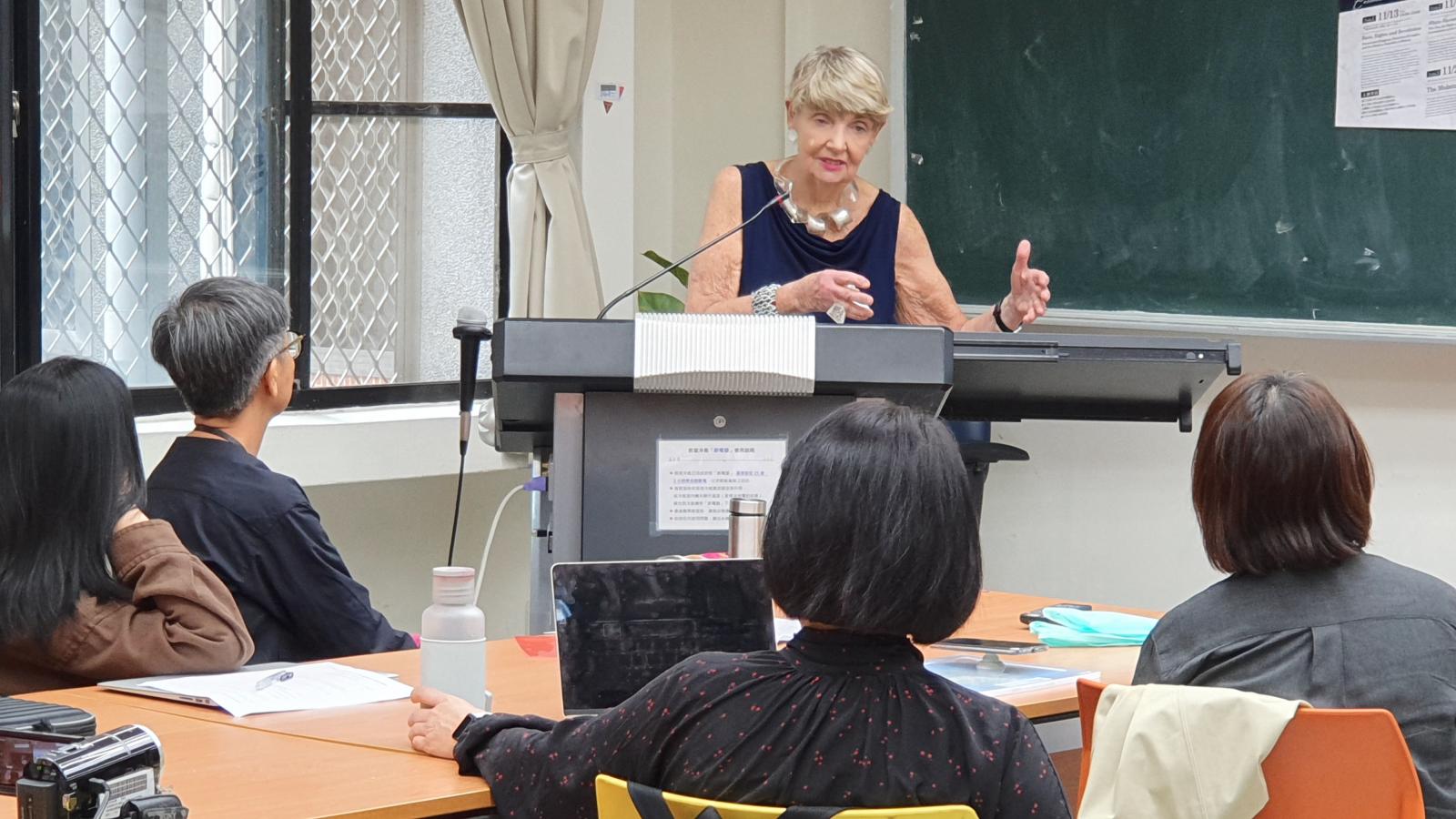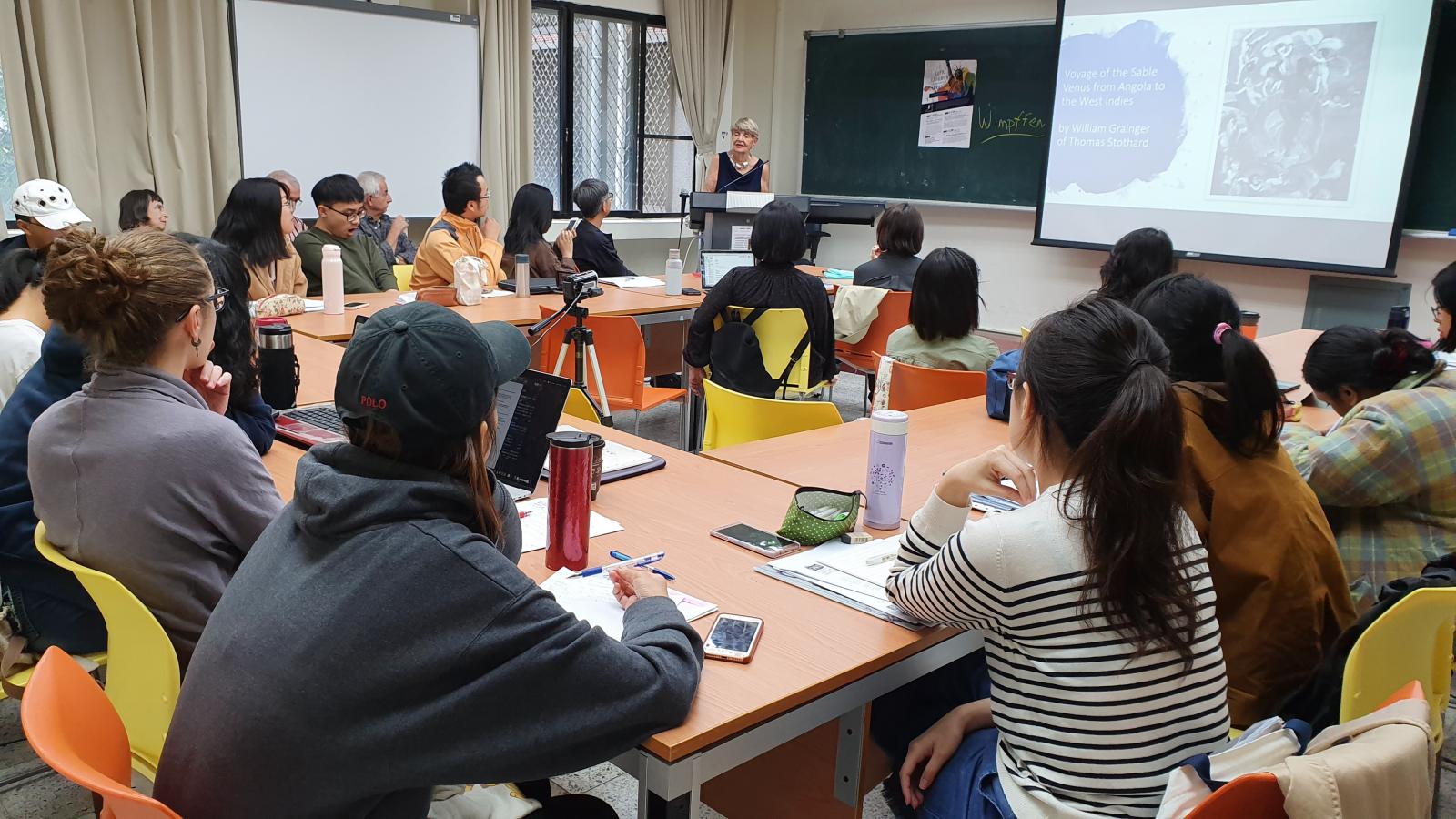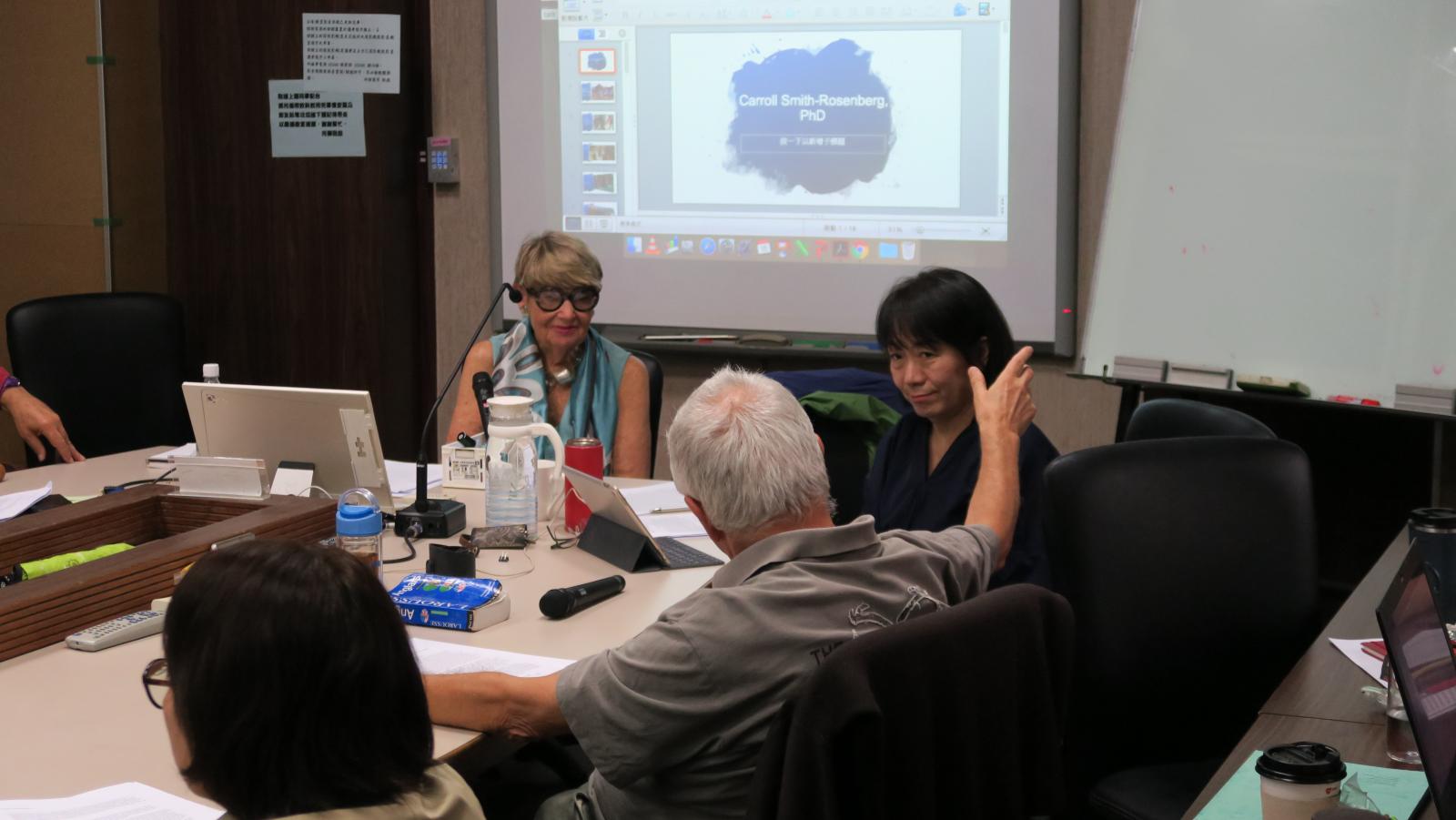

Life, Liberty, and the Pursuit of Happiness: Carroll Smith-Rosenberg Series Lectures—November 13, 18, and 20, 2019
2020-02-03
Jui-an Rae Chou
How do we make sense of inequalities and human rights crises that are rampant in our modern world? As a historian, Professor Carroll Smith-Rosenberg suggests that we do so through a critical reexamination of liberalism, revolution, and citizenship in history. Professor Smith-Rosenberg is the Mary Frances Berry Collegiate Professor of History, American Culture, and Women’s Studies, Emerita, at the University of Michigan, Ann Arbor. She is known for her path-breaking scholarship in US women’s and gender history, and for her significant contributions to developing interdisciplinary programs and international scholarly networks addressing women’s history, gender studies, the history of sexuality, and cultural and Atlantic studies. The International Center for Cultural Studies is honored to have invited Professor Smith-Rosenberg to give three lectures at National Chiao Tung University and National Central University on topics that concern the crises of our modern liberal values: equality, freedom, and human rights. These lectures offer a valuable preview for a new book that Professor Smith-Rosenberg is working on, as well as a rare opportunity for scholars in Taiwan to engage Professor Smith-Rosenberg in discussions related to local political concerns.
Lecture I: The Mulatta: The Liberal Paradox Embodied (11/13/2019, National Central University)
Professor Smith-Rosenberg’s opening lecture focused on the figure of the mulatta as the embodiment of the contradictions and paradoxes inherent to liberalism. This lecture took us back to the Age of Revolution, from Britain’s Glorious Revolution in 1689 to the rise of republics in Latin America in the 1820s, in order to examine the racialized and sexualized representations of the mulatta prevalent in liberal texts at the time. By looking at liberalism’s exclusion of otherness, Professor Smith-Rosenberg challenges Enlightenment Liberalism’s rhetoric of universal equality and unalienable rights by pointing out its inability to tackle difference and diversity.
As a racialized and sexualized category, the mulatta is a liminal figure that repeatedly challenges racial and gender definitions. Her racial fusion disrupts the stability of race as a social marker, and her image as a sexualized temptress reveals the logic of identity formation that the white male liberal subject depends upon. According to Professor Smith-Rosenberg, the mulatta constitutes the ultimate abject Other to European imperialism and political modernity during the Age of Revolution, and therefore has the potential to expose the core contradictions within liberal discourses.
In this lecture, Professor Smith-Rosenberg compared representations of the mulatta in Francophone and Anglophone texts, as well as in texts authored by male and women writers. She began her investigation with Moreau de Saint-Mery and Alexandre-Stanislas de Wimpffen’s writings about the slave society in Saint Domingue during the French and Haitian Revolutions. Both authors represented the planter elites who portrayed the mulatta as a fantasy figure of unrestrained sexuality. The mulatta served as the white planters’ defining Other by being an imagined threat to the racial and sexual order of Saint Domingue. Professor Smith-Rosenberg then turned to the British case, in the example of the writings of Edward Long and Bryan Edwards, two Jamaican writers/planters writing in the 1770s. Like the Francophone authors, Long and Edwards portrayed the mulatta as the antithesis to White European values—a licentious creature blamed for destabilizing the colonial social order. Professor Smith-Rosenberg argued that this representation of the mulatta as the abject Other repairs and perpetuates colonial discourses about white civility and superiority. Such characterization of the mulatta culminated in Edwards’ reprinting of the poem “Ode to the Sable Venus,” which was accompanied by an engraving of the Sable Venus that mimicked Botticelli’s Venus. The poem and the engraving both perpetuated the use of the figure of the mulatta to secure racial difference, patriarchal dominance, and social order in the colonial world.
The final text that Professor Smith-Rosenberg discussed was Leonara Sansay’s Zelica, the Creole (1820), which is distinct from previous examples not only in that the author is a woman, but in the novel’s multiplying identities and political subjectivities. Professor Smith-Rosenberg cited Étienne Balibar’s idea of “space[s] of freeplay” to illustrate how Zelica’s representation of constantly shifting and conflicting identities calls liberalism’s idea of identity formation into question. She explained that Zelica is a transgressive novel not only because it challenges male colonial writers’ stereotypical portrayal of the mulatta by making its title character as a bold, strong, and resourceful Creole woman, but also because it questions patriarchal authority by displacing heterosexual marriage with the love between women. Ultimately, Zelica cuts through liberalism’s inherent contradictions by representing identity as multiple and constantly shifting, and rights as inclusive and constantly expanding.


Lecture II: Revolution Race and Rights: Democratic Enigmas, Ethical Conundrums in the Modern Republic (11/18/2019, National Chiao Tung University)
Professor Smith-Rosenberg’s second lecture began with a question to the audience: How do we make sense of the worldwide human rights crises today, which appear to be a betrayal of the liberal values—universal rights, equality, and freedom—that were established in the 17th century’s “Age of Revolution”? Professor Smith-Rosenberg tackled this question via two trajectories, one political-theoretical, and the other historical. This second lecture followed the political theoretical trajectory by analyzing the contradictions inherent to liberalism’s definitions of citizenship, equality, and rights.
The lecture then moved on to the core contradiction within liberalism itself: the disconnect between inclusionary theories and exclusionary practices. This contradiction is embodied in the conflict between human rights and citizenship: while the concept of universal human rights is based on inclusionary ideals, citizenship rights were created to exclude difference. Professor Smith-Rosenberg again borrowed Balibar’s discussions about how the dissonance between citizen rights and human rights could provide the “dynamic for the transformation of the political.” Professor Smith-Rosenberg suggested that such transformation could only be achieved through collective action, and she used examples from current political movements to illustrate this point, including the Women’s March in Washington D.C. and Hong Kong’s Anti-extradition Movement.
Professor Smith-Rosenberg moved on to discuss liberalism’s inherent tendency to exclude difference, which is not only a result of liberal thought’s belief in the sameness of all men, but also because the liberal subjects require others to define their subjectivity. She used the writings of Thomas Branagan (1774-1843), an Irish immigrant to the U.S., as an example. Having witnessed the Haitian Revolution firsthand, Branagan was a staunch opponent of chattel slavery, but his writings advocated democratic visions through disturbing rhetorics. In his epic poem Avenia, for example, Branagan whitened Africa through literary allusions and by displacing political struggles onto pastoral fantasies of a distant time and place, outside of history and contemporary political circumstances. In his Serious Remonstrances Addressed to the Citizens of the Northern States, he also recommended the establishment of a new “black state,” where liberated slaves could obtain freedom separate from white America. In Professor Smith-Rosenberg’s analysis, Branagan embodies the internal conflict within liberal thought, where the fear of difference and the fear of sameness take turns fueling contradictory response to human rights struggles, both historically and in our contemporary world.
During the Q&A session, questions were raised about the relationship between Professor Smith-Rosenberg’s talk and current political uprisings in Hong Kong, including if history provides clues to the next step to take, and to what extent violence is justified in political struggles. Theoretical questions about the possibilities of a stateless society or internationalism were also posed, to which Professor Smith-Rosenberg answered that while the ideal of a borderless/stateless world is fascinating, the state is required to counteract today’s rampant global capitalism. She pointed out that democratizing democracy is an ongoing process, which is implemented by multiplying identities and ultimately exploding a fixed national identity.

Lecture III: White Slaves/Black Revolutionaries: Haiti, Barbary Captives, and the Whitening of America (11/20/2019, National Chiao Tung University)
The final lecture by Professor Smith-Rosenberg examined liberalism’s internal contradictions through a historical perspective, focusing on discourses regarding slavery in both North Africa and the U.S. in late 17th and early 18th century. Going back to the roots of white nationalism, Professor Smith-Rosenberg pointed to the warring interactions between liberalism and democracy, and human rights and citizenship rights. According to Professor Smith-Rosenberg, textual examples from the period demonstrate the “whitening” of modern liberal democracies, which broke their own promises of Enlightenment liberalism by failing to recognize the parallels between their own practices of slavery and the atrocities they perceive in North Africa and the Caribbean.
Professor Smith-Rosenberg began with the example of “captivity narratives” prevalent during the founding years of the new U.S. republic. These texts narrated the incidents where five hundred white U.S. sailors were captured and enslaved by North African “pirates” between the mid-1780s and 1805. For Professor Smith-Rosenberg, these captivity narratives, written from the perspective of horrified white Americans, served an important role in establishing the white American identity as against the barbarism of not only black “pirates” but also black slaves. In the form of books, plays, poems, and novels, the host of texts that described the “horrors of slavery” in American sailors’ enslavement by Africans failed to draw the connection between what the authors perceived as inhumanity with the injustice of slavery close to home, in the U.S. These texts established the binarism of American liberty and African slavery as a contrast between civilization and barbarism, producing an idealized image of the newly established republic as a peace- and freedom-loving liberal utopia. The practices of Othering in the texts, according to Professor Smith-Rosenberg, safeguarded white privilege by refusing to empathize with black slaves in the U.S., which would imply the sameness and exchangeability between white and black.
The second part of this lecture addressed a different set of texts: the U.S. popular press’ representation of the Haitian Revolution during the same period. As the first black republic and the first slave-free nation in the history of the world, Haiti embodied liberalism’s ideals of equality and inalienable rights. However, the popular opinion in the U.S. press at the time failed to applaud Haiti’s struggle for freedom. In contrast to the glorification of the U.S. and French revolutions, violence that took place during the Haitian Revolution were treated with horror and taken as evidence for black barbarity and black license. Professor Smith-Rosenberg concluded that it was precisely in these instances of Othering and the failure to recognize sameness that the radical promises of the American Republic and Enlightenment liberalism were whitened and broken.
During the Q&A period, the audience commented on one of the key themes of this lecture—drawing parallels—by relating to ISIS executions as a way to draw parallels between their victims and the injustice imposed upon them by the Western world. Like the examples in the lecture, however, the West failed to see the parallel due to the deep-rooted binarisms between civilization and barbarity. Another question raised the issue about the convergence of slavery and modern racism, to which Professor Smith-Rosenberg gave a historical context about racialized and non-racialized slavery. Finally, questions about the Hong Kong protests were again raised, focusing on the use of violence in the resistance. Professor Smith-Rosenberg commented that solutions to the Hong Kong situation, as it is for the tragedies taking place at the Mexican borders, may not be readily available. But asking these questions and challenging existing frameworks are important steps toward transforming the status quo.

近期新聞 Recent News


